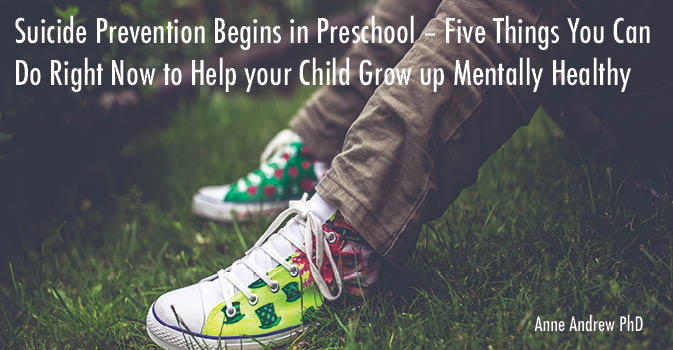 Suicide is one of the leading causes of death in 15 to 34 year-olds and is three times more prevalent in boys than in girls. The root causes of mental health problems that can lead to suicide are established in early childhood. The good news is that there is a way to reverse the effects. The sooner you can start helping your child (and yourself) to fully understand that your worth is intrinsic the better. Typically, suicide prevention strategies focus on awareness of depression and on recognizing the warning signs of impending suicide. Treatment is hospitalization or prescription of anti-depressants, which, ironically, have suicide as a potential side-effect. These strategies haven’t worked well. Suicide is poised to take over from accidents as the leading cause of death in the 15 to 24 age group in Canada.
There is another approach – a longer-term solution. Suicide can be seen as the end-result of negative self-talk that has become unbearable. The sense of worthlessness and hopelessness can eventually lead to a person believing that the world would be better off without them. What they need to know is that their worth is intrinsic – that we all have inherent worth. Our worth doesn’t depend on what we do or what we don’t do – it just is. This concept was the cornerstone for my own recovery from chronic depression, which plagued my life since I was in my teens. This concept can lead to recovery from addiction, even in severe cases, so it is a concept that we must teach children as young as possible. The negative beliefs that strengthen over the years if left unchallenged are set in the first few years of a child’s life. How can you teach this concept – that we all have worth by virtue of simply being? Here are five suggestions:
0 Comments
Leave a Reply. |
Author I know firsthand the emotional and financial costs of having a troubled teenager and I don’t want that to happen to you. That's why I wrote my book What They Don't Teach in Prenatal Class: The Key to Raising Trouble-Free Kids and Teens (available on Amazon). Archives
April 2022
Categories
All
|
get in touch
Email: [email protected] Tel: (1) 604 720 2776
Sign Up to my newsletter
Get information and articles about how to raise happy, mentally-healthy, and addiction-free kids!

 RSS Feed
RSS Feed